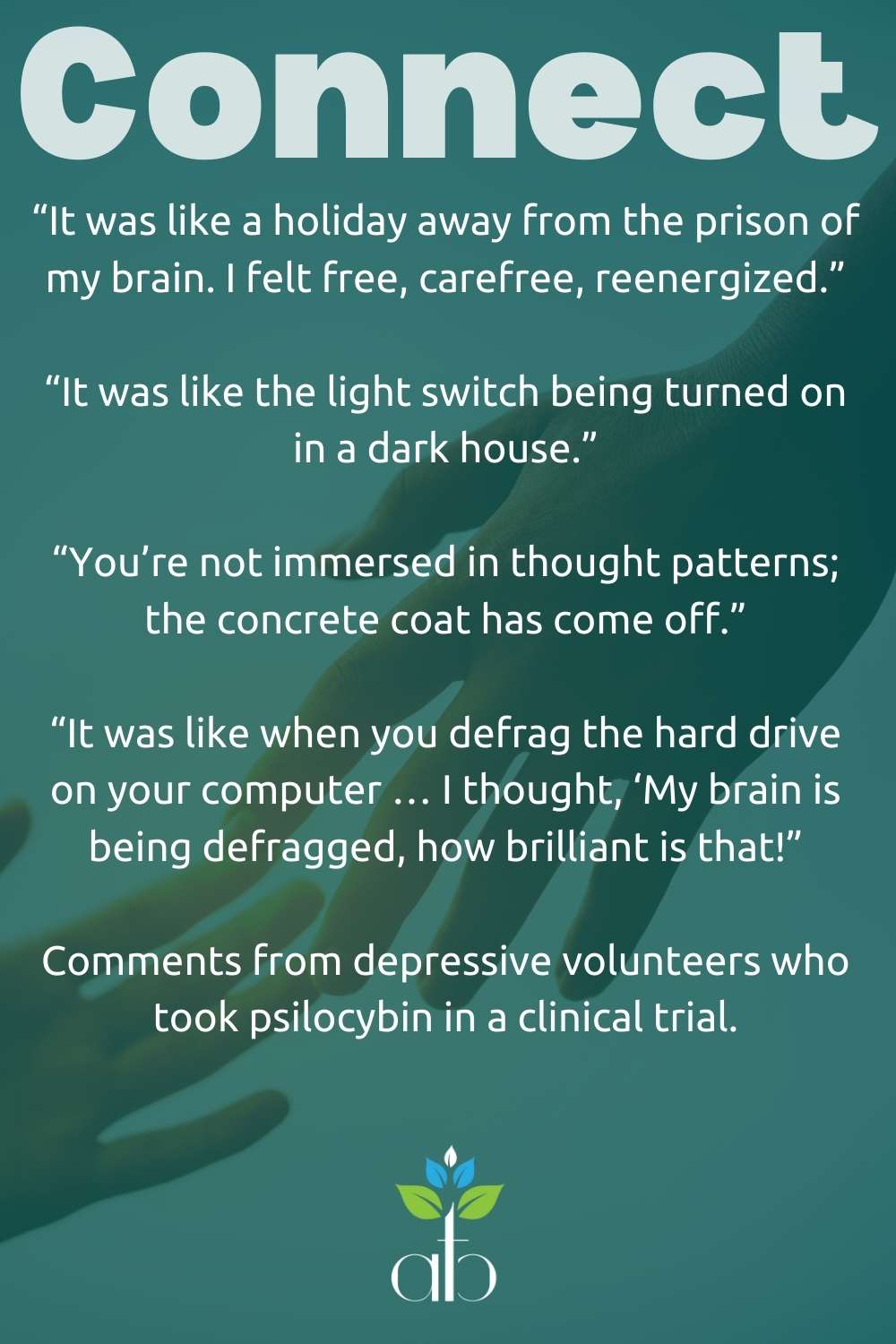Episode 320
Get Connected

People experiencing depression can find themselves feeling more and more disconnected, from others, from their own feelings. In an extreme case, a person can look at a beautiful landscape, know intellectually that it is beautiful, and have no sensation of beauty.
When we begin to negate our own emotions, hiding more and more from them, we step a path that might lead us further and further from self-knowledge.
In some studies by Dr. Rosalind Watts and others, scientists and subjects explored the role of psilocybin in facilitating connection, to the point where people started chatting to strangers about the most profound aspects of their lives, or they experience being a part of nature, rather than seeing it as an object to look at.
Hosts & Guests
Kurt Robinson
Transcript
This is how your life is already wonderful.
I want to talk to you about this book I am reading, about this passage from Michael Polland’s How to Change Your Mind which is his best selling book talking about psychedelic substances and and this part in particular was talking about how it might be helpful for people who suffer from depression.
So it describes this doctor Rosalind Watts and she joins a study as a facilitator not as a subject.
And they are looking at people with depression and it says here ”I once guided several sessions and conducted qualitative interviews with all of the volunteers 6 months after their session to determine how the psychedelic session had affected them. These interviews uncovered two master things.”
“The first was that the volunteers depicted their state of depression as a disconnection from other people, their earlier selves, senses and feelings, core beliefs, spiritual values and nature. Several referred to living in a mental prison, others to being stuck in cycles of mental rumination they likened to being stuck in gridlock.”
“I was reminded of Carhart Harris’ hypothesis that depression might be the result of an overactive default node network. The site of the brain where rumination appears to take place. The imperial depressives also felt disconnected from their senses. I would look at orchids and intellectually understand that there was beauty but not experience it.”
This is very interesting the little comment there. I think what happens to a lot of people which is quite tragic or eventually can be a learning experience. What happens is we shut ourselves off from negative emotions or view adverse emotions like fear or sadness, frustration or anger.
When we start to shut off one emotion we are starting to disconnect and shutoff from all of our emotions. So the more we negate our emotions, deny them, negate them and run from them we are also cutting ourselves off from the possibility of happiness, joy, elation, beauty, wonder. So many wonderful things.
It is like I’ve said many times the art of being happy is the skill of being unhappy. When we learn to be unhappy we can navigate through those areas to find our way to happiness. Hopefully it’s not a long way.
If we don’t do that, if we shut it off then we learn to navigate that landscape and it might take us a very long time to get back to that natural happy state which you might say is our birthright.
This is what happens with a lot of depressive subjects is they’re disconnecting from emotional selves. That’s my explanation.
“For most of the volunteers the psilocybin experiment had sprung them from their mental jails. I forgot to mention, it’s talking about psilocybin which is the active chemicals in a lot of mushrooms, so that’s what they conducted the study with, a kind of ceremony. One woman told me that in the month following her session was the first time she had been free of depression since 1991.”
“Others described similar experiences. It was like a holiday away from the prison in my brain, I felt free, carefree and reenergized.”
I do think it’s a bit of a risky metaphor saying you are in a holiday away from the prison of your brain because your brain is not a prison. All the things she experienced on that journey, those were all in a sense going on in her brain as well. She wasn’t taking a holiday, she was simply experiencing her own brain and life in a different way.
Not really a holiday and not really a prison. So but obviously you can understand what she’s trying to get at. Like a light switch being turned on. Not immersed in thought patterns, the concrete coat has come off.
That’s a metaphor about being in depression it feels like moving everything is just moving through treacle. It is so difficult to get anything done, to move even, a concrete coat.
“Its like when you defrag a hard drive on a computer. I thought My brain is being defragged, how brilliant is that!”
“Many of the volunteers these changes in the experiences of their own mind persisted. My mind works differently, I ruminate much less and my thoughts feel ordered, contextualized. Several reported reconnecting to their senses, a veil dropped from their eyes, things were suddenly clear and growing bright. I look at plants and notice their beauty.”
I still look at my orchids and feel that, that is the one thing that has really lasted. Some reconnected to themselves, I had a feeling of tenderness to myself.”
That is really sweet, just imagine, think about that right now. What is it like to feel tenderness towards yourself? You might consider yourself flawed, you’re not perfect. Maybe you still make mistakes but you can be tender to yourself and give yourself a bit of space within.
“At its most basic, I felt like I used to before the depression.”
“Others reconnected to other people, “I was talking to strangers having these full blown conversations with everyone I came into contact with.”
This is really great so if you follow Professor Lauri Santos and her course on Coursera about the Science of Wellbeing that is one of the key things she mentions. Happy people meet people, happy people are connected. Actually she mentions to strangers but could be anyone.
If you have a rich social life, especially if you’re meeting people you’ve never met before.
“I would look at people on the street and think “how interesting we are and I felt connected to them all and to nature. Before I enjoyed nature, now I feel part of it. Before I was looking at it like a thing, like TV or a painting.
But now I am part of it there is no separation or distinction. You are it.”
Thats an important thing so many times we look at things as if we are separate but there’s no clear point if we look on a physical level there is no scientific point where we can say one thing ends and another begins. All atoms and molecules and energy.
“I was everybody, unity. One life with 6 billion faces. I was the one asking for love and giving love. I was swimming in the sea and the sea was me.”
Those are some insights about connection. It does talk a bit about addiction too in the chapter, many people have probably heard there’s that speech where he talks about the problem with addiction isn’t the substance, it’s actually lack of connection.
Or the Rat Park experiment by Dr. Alexander that’s also really fascinating to look into. These are all opportunities that we have. We don’t have to take psilocybin. Sometimes that can help us along but if we do look for connection, he who seeks will find.
How is it that you can be connected to people, to nature, to yourselves.

New Episodes Every Weekday
11am Mexico City time
10 min episodes Monday - Thursday
1 h interview episode on Fridays
As an Amazon Associate I earn from qualifying purchases.
Stay Beautiful &
Stay Connected
